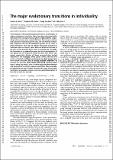The major evolutionary transitions in individuality
Abstract
The evolution of life on earth has been driven by a small number of major evolutionary transitions. These have been characterized by individuals that could previously replicate independently, cooperating to form a new, more complex life form. For example, archaea and eubacteria formed eukaryotic cells, and cells formed multicellular organisms. But not all cooperative groups are on route to major transitions. How can we explain why major evolutionary transitions have or haven't taken place on different branches of the tree of life? We break down major transitions into two steps, the formation of a cooperative group and the transformation of that group into an integrated entity. We show how these steps require cooperation, division of labour, communication, mutual dependence and negligible within group conflict. We find that certain ecological conditions and the ways in which groups form have played recurrent roles in driving multiple transitions. In contrast, we find that other factors have played relatively minor roles at many key points, such as within-group kin discrimination and mechanisms to actively repress competition. More generally, by identifying the small number of factors that have driven major transitions, we provide a simpler and more unified description of how life on earth has evolved.
Citation
West , S , Fisher , R , Gardner , A & Kiers , E 2015 , ' The major evolutionary transitions in individuality ' , Proceedings of the National Academy of Sciences of the United States of America , vol. 112 , no. 33 , pp. 10112-10119 . https://doi.org/10.1073/pnas.1421402112
Publication
Proceedings of the National Academy of Sciences of the United States of America
Status
Peer reviewed
ISSN
0027-8424Type
Journal article
Description
We thank the Calleva Research Centre, Magdalen College, the European Research Council, the Natural Environment Research Council, and the Netherlands Organization for Scientific Research for funding.Collections
Items in the St Andrews Research Repository are protected by copyright, with all rights reserved, unless otherwise indicated.

